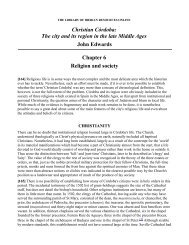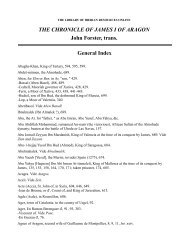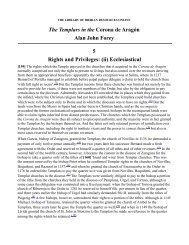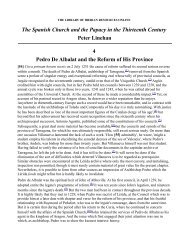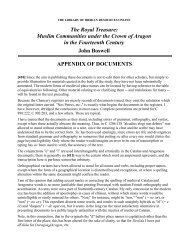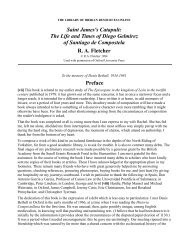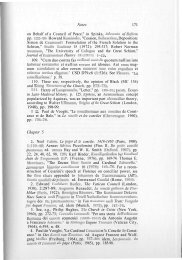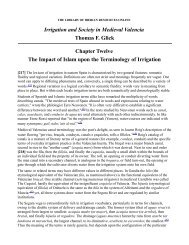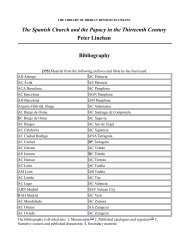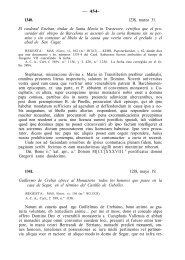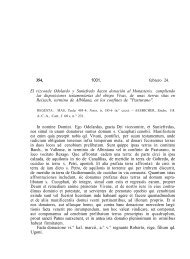PROTESTANTISM - The Library of Iberian Resources Online
PROTESTANTISM - The Library of Iberian Resources Online
PROTESTANTISM - The Library of Iberian Resources Online
You also want an ePaper? Increase the reach of your titles
YUMPU automatically turns print PDFs into web optimized ePapers that Google loves.
objects <strong>of</strong> suspicion, and the Catholic was as liable to arrest as the Calvinist. Jacques Zacharie, a dealer<br />
in rosaries and images in Burgos, in 1637, chanced to be relating his adventures with the heretics in<br />
France who, in examining his baggage, had said ' Let him take these wares to Spain and bring us back<br />
good money," when one <strong>of</strong> his hearers expressed surprise that the Most Christian king would let<br />
heretics dwell in his land. This led Jacques patriotically to defend them as good baptized Christians,<br />
who lived righteously according to their law. He was asked how they could be Christians when they did<br />
not go to mass and confess to priests, when, in the heat <strong>of</strong> discussion, he replied that there was not<br />
scriptural command <strong>of</strong> sacramental confession. For this he was denounced to the Valladolid tribunal; he<br />
was arrested and tried and all his property was sequestrated. (102)<br />
It is no wonder therefore that the tribunals were kept busy with these cases and that the records are full<br />
<strong>of</strong> them, especially under the crown <strong>of</strong> Aragon, owing to the propinquity <strong>of</strong> south-western France,<br />
where Huguenotism was in the ascendant. In Saragossa the relaxations for Lutheranism, from 1546 to<br />
1574, though amounting to only seven, were all <strong>of</strong> Frenchmen. (103) Barcelona was more active. In an<br />
auto <strong>of</strong> May 16, 1561, there appeared for Lutheranism, eleven Frenchmen, one Piedmontese and one<br />
Maltese. In that <strong>of</strong> July 11, 1563, there were thirty-four Frenchmen, two Italians and two Catalans, <strong>of</strong><br />
whom eight Frenchmen were relaxed in person and three in effigy. In that <strong>of</strong> March 5, 1564, there were<br />
twenty-eight Frenchmen, two Catalans and one Swiss, <strong>of</strong> whom eight Frenchmen were relaxed in<br />
person and two in effigy. (104) From a report by Dr. Zurita <strong>of</strong> his visitation in the summer <strong>of</strong> 1564, we<br />
obtain a glimpse <strong>of</strong> how these autos were fed. At Perpignan, for Lutheranism, five persons were<br />
arrested with sequestration, <strong>of</strong> whom four, and possibly all five, were French. At Castellón de<br />
Ampurias, Maestre Macian, a Frenchman, was sent [459] to Barcelona for trial. Jean de Adin, a<br />
Frenchman <strong>of</strong> Aldas, escaped arrest by flight, and the arrest was ordered <strong>of</strong> Pere Bayrach, a Frenchman<br />
<strong>of</strong> Flasa. (105) When, simultaneously with this, the ambassador Saint-Sulpice complained to Philip II <strong>of</strong><br />
the cruelty exercised on his fellow-countrymen, who were peaceably plying their industries, without<br />
creating scandal, the king coolly replied that the Inquisition acted without regard to persons, but<br />
nevertheless he would speak with the inquisitor-general. (106)<br />
<strong>The</strong> complaint <strong>of</strong> cruelty was justified. In the rebuke which the Suprema administered to the tribunal <strong>of</strong><br />
Barcelona, in 1568, as the result <strong>of</strong> de Soto Salazar's visitation, allusion is made to a case, in 1565, <strong>of</strong> a<br />
Frenchman named Antoine Aymeric, arrested without evidence; his first audience was held at his own<br />
request February 23d, the second on July 27th, when, without more ado, he was tortured and sentenced<br />
to reconciliation and confiscation. In another case <strong>of</strong> a Frenchman, Armand Jacobat, he was tortured<br />
without confession, but subsequently admitted some Lutheran errors, begged for mercy and desired to<br />
be converted, in spite <strong>of</strong> which he was relaxed and burnt, for which the Suprema held the tribunal to be<br />
gravely in fault. (107) What became <strong>of</strong> those not burnt is seen in a report <strong>of</strong> December, 1566, to Charles<br />
IX, by his ambassador M. de Fourquevaux, that seventy poor Frenchmen, prisoners <strong>of</strong> the Barcelona<br />
tribunal, had been condemned to the galleys and had been delivered, in November, to Don Alvar de<br />
Bazan, who had taken the fleet to winter near Cádiz. In February, 1567, he writes that, on complaint to<br />
the Duke <strong>of</strong> Alva, the latter had assured him on his honor that they were all dogmatizing Huguenots;<br />
that Frenchmen were never arrested for Protestantism if they had not said or done something<br />
scandalous. This was as mendacious as the repeated promises to release the galley-slaves, which were<br />
always evaded until Fourquevaux recommended the seizure as a hostage, at Narbonne, <strong>of</strong> Andrea<br />
Doria, the naval commander-in-chief. At last, on December 20th, he reported the sending <strong>of</strong> royal<br />
letters to Doria to release them, but it is fairly questionable whether the order was obeyed. Again, in a<br />
list <strong>of</strong> complaints made by Charles IX to Philip, there was one concerning five <strong>of</strong> his subjects arrested<br />
in Havana and sent to [460] Seville for trial, to which Philip replied that he was not accustomed and did<br />
not desire to interfere in such affairs, but nevertheless he would have the inquisitor-general requested to



